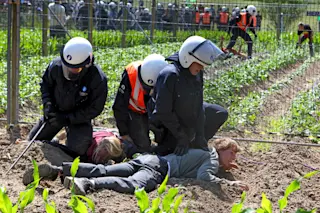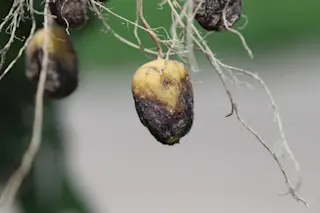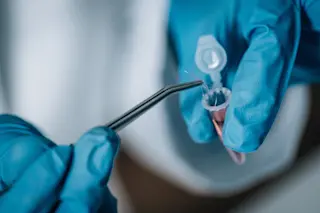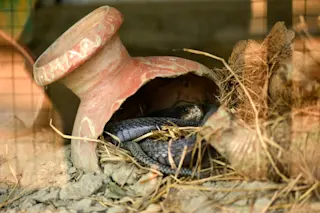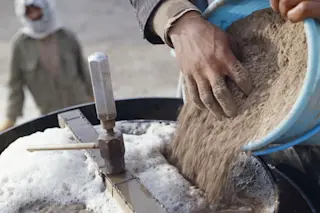Not long after midnight on July 9, 2011, six men descended on a fenced-in field at biovativ, a research facility in the northern German town of Gross Lusewitz. It was a clear, warm Saturday night, and the 115-acre farm was lit by a half moon.
Moving quickly, the men surrounded the night watchman. Shining their flashlights in his face and threatening him with pepper spray and clubs, they frisked him, took his flashlight and keys, and smashed his cell phone. Then they headed directly for their target, a potato patch the size of a tennis court. Within minutes, the potatoes—part of a research project run by the nearby University of Rostock to see if rabbit vaccines and plastic polymers could be grown in plants—had been ripped out of the ground or trampled.
Two nights later, at a farm 100 miles to the south, the scene repeated itself almost exactly. This time, a dozen masked men overpowered two guards at the Üplingen Plant Science Garden, hopped a waist-high wire fence and trashed a plot of genetically modified potatoes, along with part of a nearby stand of transgenic wheat. As police cars sped toward the farm, the raiders melted into the night.
“It’s years of lab work and greenhouse work destroyed,” says Uwe Schrader, one of the farm’s two managers. “There won’t be any results.”
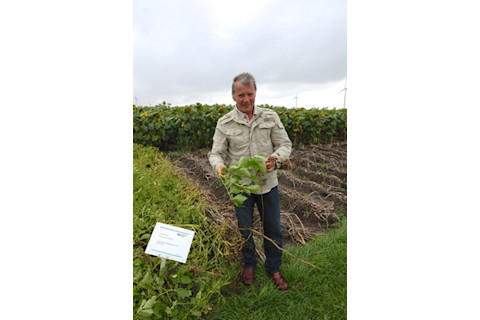
Uwe Schrader points out genetically modified crops damaged in a raid. Andrew Curry
Both the farm in Gross Lusewitz and the Üplingen fields are paid by multinational seed and chemical companies like Monsanto, BASF, and Syngenta to conduct field trials with genetically modified crops. But instead of targeting corporate greed, these raids signaled something else: The wrecked potato trials, proof-of-concept experiments funded with public money and years away from any commercial application, were sponsored by university biology departments.
“They targeted these particular trials to weaken research in Germany,” says Kerstin Schmidt, CEO of biovativ.
The irony is thick because techniques used to insert genes from one organism into another were developed in European university labs more than 30 years ago, and the first stabs at commercial cultivation of so-called “transgenic” crops occurred in Europe’s fields. Yet genetically modified organisms (GMOs) are now restricted from cultivation in Austria, Hungary, France, Luxembourg, Germany, and Greece.
Of the 395 million acres of so-called “biotech” crops planted globally in 2011, 282,911 were in Europe, according to the International Service for the Acquisition of Agri-biotech Applications, a pro-GMO nonprofit. That’s 0.07 percent of the world’s total.
American farmers, on the other hand, planted 170 million acres of transgenic crops last year; 93 percent of the soy grown in the U.S. is genetically modified. Brazil and Argentina grow tens of millions of acres of genetically modified cotton, soy, and corn. India is climbing onto the GMO bandwagon as well.
For the labs that started it all, the impact has been devastating. “Scientists develop a trait and have something that works and they’re excited about, and they simply can’t afford to get the testing through,” says Terri Raney, a senior economist at the Food and Agriculture Organization in Rome.
THE PUBLIC FACE OF PROTEST
For a hard-core group of protesters combating genetically modified crops through whatever means necessary, that’s excellent news.

Blue-eyed and burly, beekeeper Michael Grolm is the face of Germany’s best-known anti-GMO campaign, a loosely organized network of activists called “Gendreck Weg,” or “Gene Trash Gone.” Since 2005, Gendreck Weg has organized well-publicized “field liberations” aimed at destroying open-air tests of genetically altered crops.
Drawing on the time-tested tactics of the civil rights movement, Grolm made sure “liberations” were announced months in advance; demonstrators arrived in photogenic convoys of tractors, wearing hazmat suits or beekeeper’s hoods. After ripping up plots of genetically altered corn, wheat, or potatoes, they sometimes planted organic varieties, calling it a “corn exchange program.”
“We had to go out into the fields and do it in a very public way, so the population wouldn’t see us as criminals,” Grolm says. “Hundreds of police show up, and it’s interesting for the press too.”
Activists made a point of sticking around afterward, hoping to be apprehended. Since his first arrest, in 2008, Grolm has spent more than a month in jail, for everything from trespassing and contempt of court to refusing to pay token fines.
He’s also been served with restraining orders from U.S. agribusiness giant Monsanto, something he was happy to violate. “If they send me to jail again, I’ll go in smiling, and come out smiling,” he says.
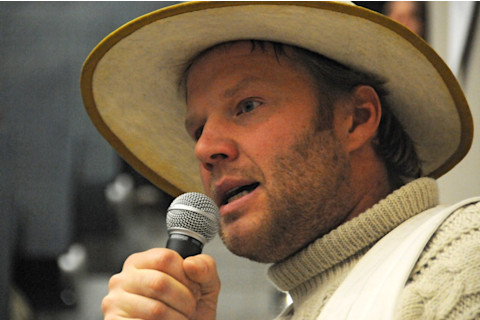
Michael Grolm, beekeeper and activist. Benjamin Todtman
I meet Grolm at Tonndorf Castle, a dilapidated stone fortress on top of a hill near Erfurt, where he lives communally with about 60 other people. A dirt road winds up from a valley full of neatly plowed farm fields to the castle’s dry moat.
After a lunch of lentil soup, brown rice, and home-pressed apple juice in the castle’s communal dining room, I follow the beekeeper-turned-activist to a small gatehouse where he lives with his partner and their son.
As his towheaded, red-cheeked toddler sleeps soundly on the couch next to him, Grolm tells me biotechnology research is nothing more than a stealth effort to wipe out Europe’s organic farmers—and beekeepers like him.
“I don’t think it’s a sincere effort to do science,” he says. “Their strategy is to contaminate things here to open the door for GMO agriculture. If I were a scientist that really wanted to study this, what would I do? I’d go to America, where everything’s already contaminated.”
Grolm accuses labs like biovativ of deliberate sloppiness, saying they intentionally mislabel test plots and allow seeds and pollen from experimental plants to contaminate nearby fields. The beekeeper says he’s afraid that once genetically altered plants are set loose on the European environment, there will be no way to call them back.
“There’s no good gene technology. It’s like atomic energy—once you open the door, you can’t close it,” he says. “We can’t get rid of it once it’s out in the world.”
I ask Grolm if Gendreck Weg had anything to do with the recent nighttime assaults in Gross Lusewitz and Üplingen. He smiles and leans back on the couch.
“That’s not our thing, but you can’t really control it,” he shrugs. “I can only tip my hat to the people who did this and congratulate them. They probably prevented a much greater form of violence by keeping these plants from contaminating humanity’s seed stocks.”
WHO NEEDS ANOTHER GREEN REVOLUTION?
Even though decades of research haven’t turned up any conclusive evidence that genetically modified plants pose a health risk, barely a quarter of Europeans are willing to see them become part of the food supply.
Many see no need: The continent’s population is expected to peak in just 25 years, and dwindle after that.
But Europe is an exception. The world is fast approaching a breaking point. Already at 7 billion, the global population is expected to increase by 2 billion to 3 billion in the next 40 years before leveling off. With much of the world’s prime farmland already under the plow, there’s not much wiggle room to feed those extra mouths.
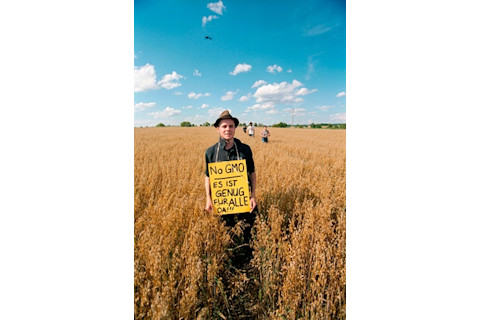
"No GMOs! There's enough here for everyone!" reads a protester's sign near Strausberg, Germany, 2005. David Baltzer/Zenit/LAIF/Redux
The Food and Agriculture Organization of the United Nations estimates that by 2050, the world will need to produce 70 percent more food, including an additional billion tons of cereals, to keep up with population growth.
We have been here before. In the years after World War II, basic principles of public health and sanitation dramatically extended life expectancy around the world. One consequence was an equally dramatic shortfall in food supplies.
One man had a lot to do with changing that.

Norman Borlaug in Mexico, 1970. Bettman/Corbis
Beginning in 1944, Iowa-born biologist Norman Borlaug spent nearly 30 years in Mexican fields, crossing different kinds of wheat strains by hand. Using conventional breeding techniques, Borlaug’s crucial breakthrough was crossing stubby-stalked dwarf wheat with high-yielding varieties, resulting in a plant that was both extremely productive—when given ample fertilizer—and strong enough to hold up under the weight of large clusters of grain.
Borlaug’s modifications increased the productivity of Mexican wheat farmers sixfold over traditional varieties. Agronomists went on to breed “semi-dwarf” rice plants using the same principles, fundamentally altering a crop that half the world relied on for daily sustenance. The world went from food shortage to food surplus; meanwhile, its population more than doubled.
Admirers called these breakthroughs the Green Revolution. But not everyone was pleased.
The new crop strains were dependent on mechanization, controlled irrigation, and artificial, petroleum-based fertilizers for their astonishing productivity, making it hard for small farmers to compete and dramatically increasing the use of pesticides. In many cases, the hybrid seeds had to be repurchased from seed companies each year, helping to turn a handful of American and European seed breeders into corporate giants.
The excesses of the Green Revolution were decried by activists from the start. “In perceiving nature’s limits as constraints on productivity that had to be removed,” Indian physicist Vandana Shiva wrote in 1991, “American experts spread ecologically destructive and unsustainable agricultural practices worldwide.”
Others have argued that the Green Revolution saved hundreds of millions of people in several nations from starvation as their numbers outstripped food production. In 1970, when Borlaug was awarded the Nobel Peace Prize, he suggested that the search for more productive crops was never-ending. “We may be at high tide now, but ebb tide could soon set in if we become complacent and relax our efforts,” he said.
THE NEXT BIG THING
By the 1980s, scientists had declared gene modification the next big thing.
The breakthrough heralding the new age came from Belgium, where Ghent University biologists Marc van Montagu and Jeff Schell were studying a bacterium called Agrobacterium tumefaciens. Shaped like a tiny pill, the bacterium lives in the soil and causes infected plants to grow what amount to plant tumors, often called crown galls.
The researchers showed that A. tumefaciens was altering the genetic code of infected plant cells by lending them genes, causing them to grow out of control. No one wants to give plants tumors. But if two entirely different organisms—a bacteria and a plant—could swap genes, then the potential for altering crops directly by gene transfer was vast.
Today, van Montagu runs a small institute out of a paper-strewn office at Ghent University dedicated to producing genetically modified crops for the developing world. A wood statue of Gandhi sits on his desk; high on a bookshelf is a bust of his great-grandfather, a founder of Belgium’s Socialist party.
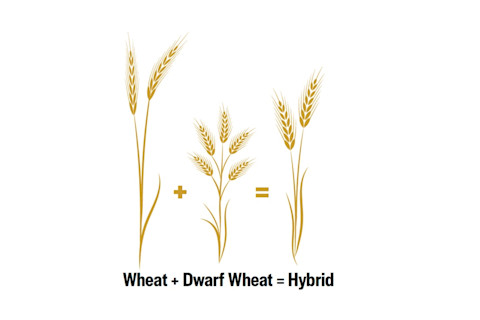
Alison Mackey/Discover
As a student in the early 1950s, van Montagu followed in his footsteps, leading Belgium’s student socialist movement and taking trips to communist Poland, Czechoslovakia, and Russia. With a lilting Flemish accent, thick glasses and a bucktoothed smile, the 79-year-old has the energy of a much younger man, eagerly reminiscing about his lab’s heyday in the 1970s.
Years of research confirmed the team’s early hunch. Inside each bacterium were structures called plasmids, free-floating strands of genetic code. The A. tumefaciens plasmids broke into the plant cell and penetrated its DNA, inserting up to 25,000 base pairs of its own. The snippet of plasmid DNA altered the cell’s behavior, hijacking it and causing uncontrolled growth.
Understanding how the crown gall bacteria altered plant cells without destroying them was a critical breakthrough, one that opened an entirely new set of possibilities. It meant that researchers could take out the plasmid DNA that caused crown galls and replace it with carefully selected bits of genetic code from other organisms.
Using the bacteria’s hollowed-out plasmids as delivery vehicles, new genes conferring valuable traits could be slipped into a plant’s DNA. With enough tinkering, it was theoretically possible to meld the massive size and speedy growth of the African miscanthus grass with, say, drought-tolerant rice.
To test the discovery, van Montagu drew on a popular organic pesticide derived from another bacteria,Bacillus thuringensis, or Bt, which is still sprayed on organic farms today. Bt produces a protein that is deadly to a very narrow category of pests, including the corn borer worm.
Van Montagu first isolated the DNA responsible for producing the bug-killer protein, then spliced it into the genome of A. tumefaciens. He used this genetically altered version as a Trojan horse to implant the protein into tobacco plants, which could then manufacture their own pesticides.
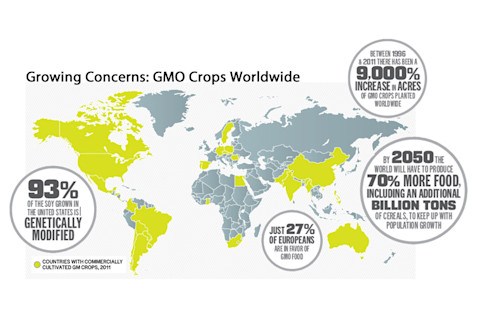
In 2011, genetically modified crops were cultivated commercially in 29 countries. The United States led the way with 170.5 million acres of commercial genetically modified crops grown, while Brazil, Argentina, India, and Canada each grew more than 24.7 million acres. Alison Mackey/Discover
In the three decades since van Montagu’s breakthrough, transgenic crops have been adopted faster than any technology in the history of agriculture. Between 1996 and 2011, the number of acres planted with genetically modified crops worldwide went from 4 million to 395 million, a 9,000 percent increase in the space of 15 years.
GMO-FREE ZONE
Yet Europe remains an island of determined opposition. At an experimental greenhouse I visited not far from van Montagu’s Ghent University office, growing experimental transgenic rice requires biohazard protocols that seem more appropriate to culturing Ebola.
Seedlings are individually bar coded and transported in locked black trunks emblazoned with a biohazard sign. Irrigation water is sterilized using ultraviolet light and trucked to purification stations. Harvested plants are steamed for two hours at over 200 degrees Fahrenheit to make sure there’s no chance of a seedling surviving.
That’s the way organic farmers want to keep it. Back in Germany, I visit Volker Rottstock, a sturdy, white-haired farmer who greets me at the door of his house wearing a navy T-shirt and blue work pants. His dog, a black and white Munsterlander, is by his side.
Rottstock’s 400 acres outside Berlin are devoted to potatoes, grain, and grass for his herd of 100 cattle. A sign in German on the barnyard gate reads, “We Work Without Genetic Technology.”
On the cracked concrete floor of his barn, the year’s linseed crop is spread out in a layer a few inches thick. “When I can, I dry seeds without electricity. I use the sun, the wind,” he says, leading me past an ancient East German Trabant car and into an ivy-covered brick farmhouse sporting new solar panels on the roof.
In 2006, word got around that one of Rottstock’s neighbors was thinking about planting a dozen acres of transgenic corn. It felt like a direct threat. If transgenic pollen drifted into his organic-certified fields, Rottstock would be unable to sell his potatoes and wheat at the premium that organic food commands.
He helped rally locals to pressure his neighbor into calling off the crop and gathered signatures from some 200 area farmers who have pledged to avoid transgenic crops as well.
Gene Trash Gone leader Grolm agrees there’s no room for compromise: Europe must be kept biotech-free, he insists, or he and other small organic producers like Rottstock will be wiped out.
“These companies keep calling for coexistence, but I call it KO-existence,” the beekeeper says. “They just want to knock us out—it’s the biological equivalent of locking a wolf and a sheep in a pen together to see which one survives.”
The sheep has managed to prevail. In January 2012, Europe’s anti-biotech movement won a significant battle, though not the war. In the wake of the activists’ attacks, German chemical giant BASF raised a white flag, announcing it would move most of its field trials out of Europe and halt efforts to develop crops intended for the European market alone.
POLITICAL PLANT SCIENCE
As transgenic crops have spread around the world without the apocalyptic environmental consequences activists initially foretold, objections to the technology have shifted away from science.
When I asked European parliamentarian Martin Häusling, an outspoken anti-GMO activist who owns an organic farm and dairy in central Germany, whether science would ever be able to prove to him transgenic crops were safe, he said I was missing the point. “It’s a social question,” he told me. “What kind of agriculture do we want?”
“Decision making in this area of Germany is ideology, not science,” says Hans-Jörg Jacobsen, a voluble researcher at Leibniz Universität Hannover whose specialty is transgenic legumes. Jacobsen moved his legume experiments to North America last year; he plans to follow when he retires in 2014.
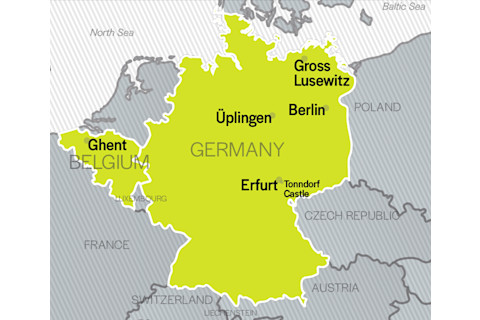
Agricultural scientists pioneered genetically modified organisms in Belgium and Germany, but today, these are GMO-free or restricted zones. Alison Mackey/Discover
The pall cast over GMO research in Europe is an outcome van Montagu never could have predicted. After his initial discoveries in the early 1980s, the area around Ghent became a biotech boomtown, attracting Monsanto, BASF, and Bayer.
In the 1980s and 1990s, everything from genetically modified tobacco and chicory to sugar beets was grown experimentally in fields nearby. Researchers from around the world flocked to his lab, which swelled to over 200 staff members. In 1990, van Montagu was named a baron by the Belgian king.
Seen from the lab bench, it all made sense. To researchers like van Montagu, transgenic plants are controlled, perfected versions of what plants do all the time anyway: tweaking their DNA, switching sections of it off, and amplifying others in a constant quest for the evolutionary edge.
“Studies during the past decade have clearly documented that a genome is not a static entity but a dynamic structure continuously refining its gene pool,” van Montagu wrote in a recent memoir.
Humans have done their part, too—it’s taken millennia of deliberate interference to shape the crops we grow. Modern corn resembles teosinte, its wild ancestor, the way a teacup Chihuahua resembles a gray wolf.
“The agricultural environment in which we produce our food doesn’t exist in nature,” says Swiss plant ecologist Bernhard Schmid.
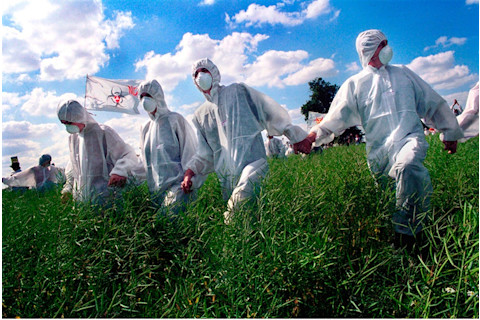
Protesters storm a field of genetically modified rapeseed in Watlington, England, 1999. Karen Robinson/David Hoffman Library/Alamy
But ecologists, in particular, express misgivings about transgenic crops because from their perspective, molecular biologists have a narrow view of how plants work outside the lab.
By ignoring the potential that transgenic crops have to cross-breed with wild relatives, they risk imposing a monoculture on the diverse biological world. By encouraging farmers to continue planting just a handful of crop strains, critics say widespread use of a few varieties of GMO crops might limit genetic diversity and thus the ability to survive in altered form when pests or other hazards unexpectedly arrive.
On top of that, critics say, GMO crops have not been proven universally safe, and they must be evaluated one by one. Doug Gurian-Sherman, senior scientist at the Union of Concerned Scientists in Washington, D.C., and a former regulator for the Environmental Protection Agency, likens traditional breeding to rearranging the deck chairs on a familiar ship.
“In most cases we’re working with varieties where the genes and their products have been consumed for millennia,” he says, although even then, dangerous traits can emerge.
Genetic engineering, on the other hand, can introduce genes that have never been in the food supply, with unknown consequences. “Genetic engineering is fundamentally different. It’s disingenuous to say this is a new and more precise way to do breeding,” Gurian-Sherman says. “I don’t think it’s as inherently risky as some people say, but I do think the risks are higher.”
THE TRAIT MILL GRINDS ON
Sitting in the university conference room, looking pale and a little sad under the fluorescent lights, van Montagu seems dispirited when I ask him how things could have gone so wrong for the technology he helped pioneer. “For a scientist, science looks obvious,” he says. “I guess you can say we were naïve.”
Naïve, and unlucky. Wellesley College agricultural policy specialist Robert Paarlberg says transgenic plants may have been the victims of bad timing. In spring 1996, Britain was in the middle of the mad cow crisis. Food safety officials in Britain had assured consumers that bovine spongiform encephalopathy, or mad cow disease, could not be transmitted to humans by eating beef from sick cows. They were wrong.
Hundreds of thousands of cows were slaughtered and incinerated, and dozens of people were infected with a deadly brain-wasting disease. “Europe was traumatized. Government regulators told consumers they had nothing to fear, and they did,” Paarlberg says.
That same spring, Monsanto began selling farmers genetically modified seeds. European consumers balked. Environmental groups labeled the new crops “Frankenfoods,” tying the technology to corporate behemoths like Monsanto and emphasizing the risks of biotech.
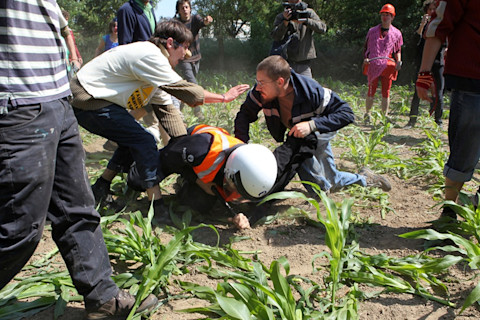
Protesters and police clash in May 2011, in a Belgian field where Ghent University and BASF planted genetically modified crops. Gianni Barbieux/Reporters/Redux
While the first transgenic plants sparked fear and controversy, suspicion seemed to stop at the fields’ edge. The same basic methods are used to coax bacteria and algae to synthesize plastics and biofuel. The pharmaceutical industry uses genetically modified bacteria and animals to produce insulin, vaccines, and a wide variety of drugs. Such applications, Paarlberg argues, are widely accepted because they provide clear benefit to consumers in the form of green fuel or reliable medicine.
“We have no problem with genomics,” says Kirtana Chandrasekaran, a campaigner for the London-based Friends of the Earth. “Our problem is with their application in GMOs.”
Perhaps that is because genetically modified crops, which boost productivity and lower cost of chemicals and fuel, benefit multinational corporations and farmers, but not consumers themselves. And to scientists like Jacobsen and van Montagu, that is most frustrating of all.
While the European Union has spent some $400 million in the past 25 years on biotech crop research, the vast majority has gone toward risk-assessment studies and not improving the crops themselves. Between legal expenses and the high-security field trials needed to comply with European safety laws—not to mention the risk that field trials will be destroyed—bringing a product to market can cost over $100 million, making developing GMOs so expensive only profit-driven agribusiness can afford it.
If they’re going to fulfill their promise, next-generation transgenics will have to do more than just protect plants from pests or weeds: The race is on to create super crops that will be more fruitful while resisting droughts or floods. Others might be engineered to include nutrients like beta carotene, iron, and vitamin A. Instead of one gene to fight off insects or disease, crops will be engineered with “stacks” of resistance genes to prevent pests from evolving resistance to a single approach.
All that will require far more knowledge about how genetic modification changes a plant. In the effort to get there, Europe could still be a hub. On a frosty March day, I pull up to a sprawling, nondescript greenhouse in Ghent. Piotr Puzio, an amiable Polish biologist, asks me to leave my camera in the car. He hands me a lab coat, safety glasses, and disposable paper booties and ushers me into what may be the world’s most sophisticated greenhouse.
As we step inside, I’m hit by a blast of tropical heat. Plastic conveyor belts running along waist-high steel platforms wind through the 32,000-square-foot facility. A small boombox plays Bob Marley’s “Could You Be Loved” as workers in blue coveralls transplant fragile rice seedlings to transparent plastic pots filled with a proprietary soil mixture. Despite the chill outside, I soon find myself sweating as I follow Puzio down rows of grass-green plants. Inside, it’s at least 82 degrees Fahrenheit, ideal for genetically modified rice.
The biotech facility belongs to a subsidiary of BASF Plant Science, and despite the European locale, the chemical giant has not pulled out. Around the clock, 365 days a year, about 8,000 plants at a time make their way through the greenhouse, each individually tracked with radio-frequency ID chips tucked into their transparent containers.
The plants periodically snake through dresser-size cabinets, where a suite of imaging equipment captures the plants’ growth from seven angles. “Every week they’re photographed from every corner and every side, like models on the catwalk,” Puzio says with pride.
Each year, the facility can analyze the changes wrought by tweaking up to 1,300 genes, each one expressed and evaluated in over 100 different model plants. Cleverly named the TraitMill, it is the centerpiece of BASF’s effort to breed the next generation of genetically modified crops.
The information gathered from these rice plants will be used to create drought-resistant corn and crops that will grow in depleted soil, perhaps on marginal land in the United States or Asia. If the dice roll the right way, BASF will make a lot of money.
But outside, a cold wind is blowing. Whatever comes out of this lab will likely never drink a Belgian rain, or spread its leaves under the German sun. And someday soon, the researchers here—along with their colleagues across the continent—will switch off the lights and move on to greener pastures.
Correction: This article was amended on March 29, 2013, to reflect the corrected figure for the cost of bringing a GM product to market.


